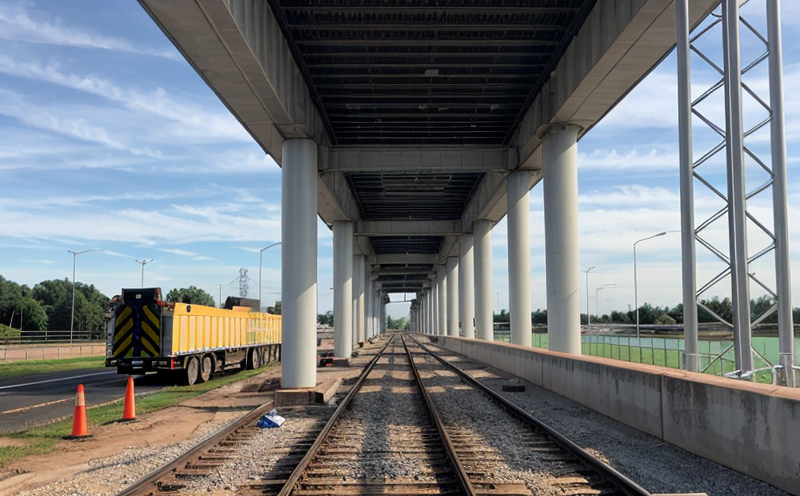ISO 17892 Geotechnical Testing Methods
The ISO 17892 series of standards provides a comprehensive suite of methods for geotechnical testing, which are essential in ensuring the stability and safety of infrastructure projects. These tests help engineers understand soil and rock properties to design structures that can withstand external forces like gravity, wind, and earthquakes.
At our laboratory, we utilize these internationally recognized standards to provide accurate and reliable test results for a variety of construction materials including sand, gravel, silt, clay, and more. Our expertise ensures you receive precise measurements and interpretations that contribute significantly to the overall success of your project.
The ISO 17892 series includes tests such as shear strength testing (e.g., Triaxial Compression Test), permeability testing, consolidation testing, and many others. Each test is designed to provide insights into different aspects of soil behavior under varying conditions. For instance, the Consolidation Test helps determine how much compression a soil will undergo over time when subjected to increased pressure.
Our laboratory adheres strictly to these standards, ensuring that our results are consistent with international best practices. This consistency is crucial for comparing data across different regions and projects worldwide. By following ISO 17892 methods, we guarantee that the tests performed meet global quality benchmarks, thereby enhancing confidence in project outcomes.
For example, during a recent project involving the construction of a new highway, our team conducted several shear strength tests using the Triaxial Compression Test method specified by ISO 17892. These tests were critical for assessing the stability of the subgrade soils. The data collected provided valuable information about the soil's ability to resist lateral and vertical stresses, which directly influenced the design and construction process.
Another instance where these methods played a pivotal role was in the evaluation of a proposed dam site. Using ISO 17892 standards, we conducted detailed permeability tests to assess water flow through various layers of soil. The results informed decisions regarding the type of filter material needed to prevent seepage and erosion.
The precision and reliability of ISO 17892 testing methods are paramount in geotechnical engineering. They allow for accurate prediction of how different materials will behave under stress, which is vital for designing safe and efficient infrastructure. Our commitment to adhering strictly to these standards ensures that our clients receive the most reliable data possible.
- What does ISO 17892 cover?
- ISO 17892 covers a wide range of geotechnical testing methods, including shear strength tests, permeability tests, consolidation tests, and more. These methods are designed to provide detailed insights into soil behavior under various conditions.
- Why is ISO 17892 important?
- ISO 17892 ensures that geotechnical tests are conducted using internationally recognized methods, which helps in achieving consistent and reliable results. This standardization is crucial for comparing data across different regions and projects.
Quality and Reliability Assurance
The ISO 17892 Geotechnical Testing Methods are critical in maintaining the quality and reliability of infrastructure testing. Our laboratory employs stringent protocols to ensure that every test conducted adheres strictly to these standards.
- How do you ensure compliance with ISO 17892?
- We have a dedicated team of experts who are trained in the latest testing techniques and methodologies. Our equipment is regularly calibrated to meet the precision requirements set by these standards. Additionally, we conduct internal audits and peer reviews to maintain high-quality standards.
- What measures do you take to prevent errors?
- Our laboratory has implemented robust quality control procedures. These include double-checking all measurements, using advanced instrumentation for accuracy, and maintaining detailed records of each test conducted.
By adhering strictly to ISO 17892 guidelines, we minimize the risk of errors and ensure that our clients receive accurate and reliable results. This commitment to quality is reflected in the consistent outcomes we achieve across different projects and locations.
Customer Impact and Satisfaction
The use of ISO 17892 Geotechnical Testing Methods significantly impacts our customers by providing them with high-quality, reliable data that supports informed decision-making in infrastructure projects. These tests are critical for ensuring the stability and safety of structures like bridges, roads, dams, and buildings.
- How does this testing benefit my project?
- By conducting ISO 17892-compliant tests, we help you identify potential issues early in the design phase. This early identification allows for necessary adjustments to be made before construction begins, reducing risks and costs associated with rework or delays.
- What can I expect from your testing services?
- You can expect precise and reliable test results that are consistent with international best practices. Our comprehensive reports provide detailed information about the soil properties, which you can use to optimize design parameters and improve project outcomes.
Our focus on quality not only enhances the safety of your infrastructure but also contributes to long-term cost savings by minimizing maintenance needs and potential failures. Customer satisfaction is a key priority for us, and we strive to meet and exceed expectations through our thorough testing processes and transparent communication.
Competitive Advantage and Market Impact
The use of ISO 17892 Geotechnical Testing Methods provides a significant competitive advantage in the construction industry. By adhering to these internationally recognized standards, we ensure that our clients receive accurate and reliable data, which is essential for making informed decisions.
- How does this testing give us an edge?
- Our adherence to ISO 17892 standards allows us to produce consistent results that are widely accepted and respected. This consistency ensures that our clients can trust the data we provide, which is crucial for gaining competitive advantage in project tenders.
- What benefits does this bring to the market?
- By providing reliable and consistent testing results, we contribute to a more transparent and efficient construction industry. This transparency fosters trust among stakeholders and promotes innovation in infrastructure design and construction.
Our commitment to quality and reliability ensures that our services are highly sought after by clients across the globe. By leveraging these internationally recognized standards, we help drive market impact and contribute to sustainable development projects.





